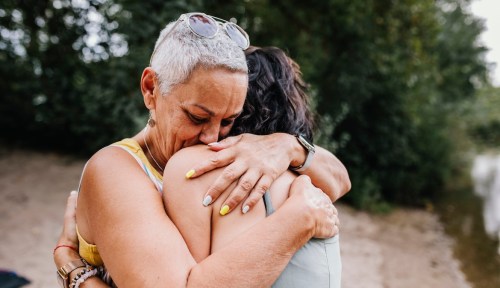Our editors independently select these products. Making a purchase through our links may earn Well+Good a commission
Any social situation can come with a few tense unknowns: How will conversations flow? What will we talk about? Will I say something awkward… or, will someone else? Because the answers to these questions unfold in real time during the interaction, you might naturally look to unpack them after the fact—particularly if things didn’t quite go as smoothly as you’d hoped. If this line of thought becomes repetitive and chronically self-critical, though, you might be engaging in what psychologists call “post-event processing.”
Experts in This Article
clinical psychologist and co-founder of Waterloo CBT Clinic
senior lecturer in psychological science at Western Sydney University, in Australia
clinical psychologist, founder of the Well-Being Lab at George Mason University, and author of five books including The Art of Insubordination
While anyone can exit a social setting and have their brain seemingly play it back to them, the phenomenon of post-event processing in psychology is often understood as part and parcel of social anxiety, says clinical psychologist Dubravka Gavric, PhD, CPsych, co-founder of Waterloo CBT Clinic. “When socially anxious individuals engage in post-event processing, they tend to fixate and dwell on negative aspects of a social interaction for extended periods of time,” she says. “It’s common for them to zero in on things that did not go well—like, things they said, another person’s reaction, their own feelings of anxiety, or how they appeared—and forget the positive things that happened.”
“The gap between how we think that we ought to have behaved and how we actually behaved is the seed of a lot of post-event processing.” —Todd Kashdan, PhD, clinical psychologist
Even if you don’t identify with having social anxiety, though, it’s important to remember that (almost) “all of us experience socially anxious moments or moments where we’re concerned with how others are perceiving or judging us,” says clinical psychologist Todd Kashdan, PhD, director of the Well-Being Laboratory at George Mason University and author of The Upside of Your Darkside. “These situations tend to elevate our expectations of ourselves, such that we can rarely meet them.” The resulting gap between “how we think that we ought to have behaved and how we actually behaved is the seed of a lot of post-event processing,” he says.
What tends to trigger post-event processing?
In short, any social setting can lead to post-event processing. “Studies have shown that it occurs after both interactions like conversations and performance tasks like speeches,” says Dr. Gavric. “But, the biggest predictor is how anxious the person felt during the social situation: More anxiousness can lead to more dwelling afterward.”
Of course, certain situations are more likely to create a sense of anxiousness from the outset than others—like “situations where you suspect you’ve made a social blunder and social settings with high stakes, where you might be able to identify some real-world consequences of any misstep you might have made,” says Dr. Kashdan. Enter: first dates, job interviews, work presentations, meeting your partner’s parents, and the like. “These are situations where your social role is essentially on the line,” he says. “The stakes are higher because these events are infrequent, and there’s importance to the relationships remaining intact.” As a result, you’re more likely to walk out of one of these interactions with a desire to play it back in your head and consider whether anything you said or did might have jeopardized the conversation—and, by extension, the relationship in question.
That behavior is more likely now, too, given that the pandemic has sheltered us from in-person interactions to the point where you might’ve lost some comfort with having them. “As we return to in-person social settings again, it’s normal to feel like they’re not going as smoothly as you’d like, which creates the conditions for more post-event processing,” says clinical psychologist Quincy Wong, PhD, whose research centers on social anxiety.
Much of the reason behind that comes from the pandemic-era spike in asynchronous communication, says Dr. Kashdan, referring to texts and emails that offer you ample time to craft a witty or thoughtful response. Now that we’re all a bit rusty on synchronous communication—which is, by contrast, “the improv and the dance of interacting with someone in real time”—it’s easier to say or do something in an IRL exchange that isn’t quite… ideal. The result? A potential face-palm moment and a greater likelihood of post-event processing as you attempt to weigh the magnitude or consequences of your misstep.
What are the potential consequences of overanalyzing a social situation after the fact?
“The problem with post-event processing is that it often makes social situations appear more negative than they really were,” says Dr. Wong. Just take the example of reviewing an interaction with your boss where you asked a question about a new project, and they yawned. “By replaying that image of your boss yawning, you might draw the conclusion that they thought your question was dumb,” he says. “In reality, though, they might have just yawned because they were up late the night before…the problem is, it often isn’t clear in social situations if something wrong actually happened.”
But if you scan any given situation for defects (that is, by overanalyzing it), you’re almost sure to turn up something out of the potential nothing. That will only serve to make you feel more nervous, upset, or anxious about what happened, potentially leading you to avoid certain social situations in the future. “Post-event processing can keep you ‘stuck in your head’ and stop you from doing the things you want to be doing and noticing important elements of your surroundings,” says Dr. Wong.
7 pointers for keeping post-event processing at bay, according to psychologists
1. Give yourself permission to be socially rusty from the jump
The mindset with which you enter a social interaction can totally shift how you perceive it once it’s over. So, giving yourself permission not to act perfectly from the outset can help lessen your mind’s analysis of what potentially went wrong and give you room to focus on the good things. “Remember that we’re all in the same boat as we reacquaint ourselves with real interactions once again,” Dr. Wong says.
2. Recognize the real (and probably low) stakes of most interactions
Adjusting how much importance or significance you’re assigning to an interaction beforehand can minimize the kind of social anxiousness that leads to post-event processing. In particular, it’s important to remember that “every interaction is not a stress test of whether you’re going to be accepted or rejected by the person on the other side of it,” says Dr. Kashdan.
“The brain regularly treats interactions as if they’re make-or-break in terms of determining certain binary decisions: Am I funny? Yes or no. Am I smart? Yes or no. But, singular interactions don’t usually have this kind of weight,” he says. While it’s true that things like first impressions and important work presentations can have outsize impacts, he caveats, in most cases, the stakes are actually lower than we set them.
3. Aim to ponder, rather than brood
Perhaps you find some comfort in reviewing social situations after they’ve happened—but you want to do so in a productive way that doesn’t lead to overt self-criticism. In this case, Dr. Kashdan suggests taking a “pondering” approach rather than a “brooding” one by embracing your inner philosophy major.
“Instead of thinking, ‘What mistakes did I make?’ or ‘What’s wrong with me?’ or ‘What are all the negative consequences of this?’ you’re exploring the situation almost like a third party. As in, ‘Huh, that was interesting. I’m surprised that it went that way. And I wonder what might have led to that,’” he says. “The idea is that you’re entering a more reflective mode, rather than an evaluative one.” And this kind of self-reflection can spare you from the harmful thought spiral that’s typical of classic rumination.
4. Scan your thoughts for potential biases
Because post-event processing can so easily warp your view of a social situation, it’s important to take a step back whenever you sense this behavior starting, in order to identify any biases in your thinking, says Dr. Gavric. She suggests asking yourself three questions:
- 1.Are you ignoring any important aspects of the social situation?
- 2.Are you making assumptions about what other people are thinking?
- 3.Are you jumping to conclusions about what this means for your future or the relationship at hand?
“Answering these questions and trying to look at the situation objectively can help,” she says.
5. Set a time limit for (a bit of) post-event processing to occur
Perhaps the biggest danger with post-event processing is that it becomes a seemingly endless thought tunnel into which you can fall deeper and deeper, with negative self-evaluation compounding on itself. One sure way to circumvent this scenario is to simply give yourself a five- or 10-minute time limit for evaluating an event after it’s over, perhaps during your downtime after work, says Dr. Wong: “This can reduce the overall amount of post-event processing you’re doing and give you a sense of control over when it occurs.”
6. Engage in a helpful distraction after high-stakes social events
If you find that any amount of reviewing an interaction once it’s over tends to leave you in a worse mood, you can interrupt that thought process with a distraction unrelated to the event—which has been shown to engender more positive post-event thoughts in folks with social anxiety. That might just mean talking to a friend with whom you’re super comfortable, or doing a solo activity like reading or listening to music, says Dr. Wong.
7. Share your post-event thoughts with trusted friends
It’s easy to feel like you’re the only one who tends to overanalyze your performance in a social setting or make awkward social blunders. But the truth is, “these are really common experiences and not something to be ashamed of,” says Dr. Kashdan. In fact, he adds, it’s our tendency to avoid speaking about these things that makes them feel unnecessarily problematic.
Instead, he suggests using your own mental chatter as a “springboard for creating more intimacy with people in your life.” In other words? Get vulnerable with someone you really trust, and describe whatever seemingly “weird” thoughts might creep into your mind during or after social situations. If you can have these conversations in a “pondering or lighthearted way, you may be surprised by how they can bring you closer to people,” he says. “Sharing these social experiences with others is what allows for and creates shared humanity.”
Oh hi! You look like someone who loves free workouts, discounts for cutting-edge wellness brands, and exclusive Well+Good content. Sign up for Well+, our online community of wellness insiders, and unlock your rewards instantly.
Sign Up for Our Daily Newsletter
Get all the latest in wellness, trends, food, fitness, beauty, and more delivered right to your inbox.
Got it, you've been added to our email list.











